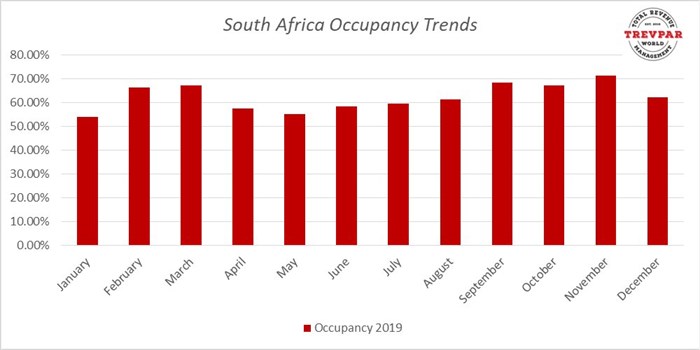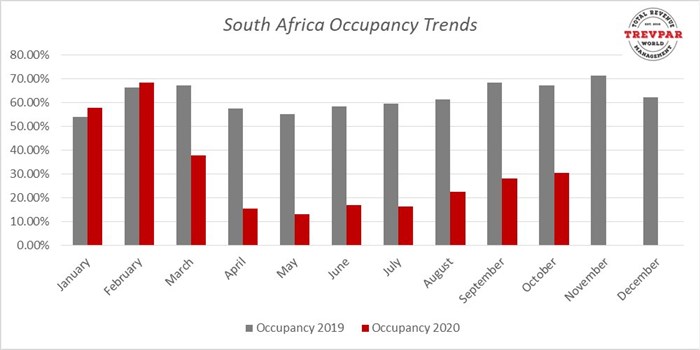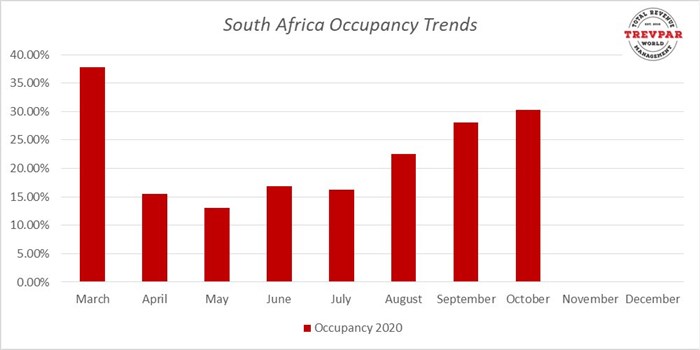
Top stories





Energy & MiningGlencore's Astron Energy gears up with new tanker amidst Sars dispute
Wendell Roelf 14 hours

More news

















Logistics & Transport
Uganda plans new rail link to Tanzania for mineral export boost











As the lockdown restrictions were applied, the hospitality sector was one of the hardest hit, majority of hotels, besides the hotels that were allowed to open for isolation and stranded travellers, had to close their doors. For many hotels, this was the first time since they opened many years ago that a full shut down was required.
The key focus for all accommodation establishments in South Africa right now needs to be on finding efficiencies to maximise on the current low demand, the demand will organically grow as we move into the future and the various establishments need to focus on that for now, it will get better if we get through this now period.
When looking at numbers, the average occupancy in South Africa for the last four years has been 63.19% on average with the highest occupancies seen in 2015 of 63.62% and the lowest in 2018 of 61.83% with the downturn attributed to the impact of international travel as the result of the Cape Town drought. 2019 showed an average occupancy of 62.25% leading the way into 2020 where January and February showed an average occupancy of 62.90%.
The upturn in the South African occupancy percentage was immediately halted as a result of Covid-19 with March dropping to occupancy of 37.82%, the lowest March occupancy recorded in the last five years.
April and May were the two lowest occupancy months during the lockdown period, the only hotels that were allowed to operate were hotels used for isolation, quarantine and stranded travels. April and May showed an average occupancy of just 14.23% which is 41.98% less when comparing to the same months in 2019.
As the lockdown restrictions eased into June, July and August there was an increase in occupancy levels reaching an average of 18.54%, despite an increase of occupancy of 23.24% compared to the previous two months, this is still very low when compared to the average occupancy of 59.61% of the same period in 2019.
As domestic travel was opened and more of the lockdown restrictions eased the largest spike in occupancies was seen, September showed occupancy of 28.11%, an increase of 80% compared to the previous month. October saw more growth in occupancy and the average South African occupancy peaked at 30.27%, the highest achieved occupancy since March.



Now looking at the crystal into the future, many elements could have a direct impact on the future occupancies of South Africa, some positive and some negative.
If the country would go into hard lockdown again, we do not foresee the industry being able to recover however if a vaccine can be rolled out we may see a boom in international tourism and some record occupancies, we need to be prepared for both.
When looking at the occupancy growth from April to October each month is showing an improvement on the last, this means that as a country, the industry is seeing increases in the number of sold rooms each month. When looking at regional level occupancies there is some very clear stand out provinces that has shown a much faster recovery and this is attributed to location as well as the product that was on offer.
For example, hotels in the Drakensberg not only showed year on year occupancy growth but also higher year on year average rates where hotels in Sandton were struggling to get into double-figure occupancies.

When looking at the growth trajectory of the occupancy in South Africa from the achieved occupancy in October compared to the worst months of April and May it is safe to say that each month is getting better than the last however still sitting at all-time lows.
When looking at the recovery trend from a pure data point of view, if nothing else changes and the same trend of the last seven months is applied South Africa could return to 2019 numbers within the next 8 – 10 months, if any external factors occur this recovery process could take as long as 24 months to full rectify back to the occupancies experiences in 2019.
The predicted upswing in domestic travel is evident across all provinces in the accommodation and flight patterns however without prioritising vaccine roll-out this recovery process will always lag as South Africa has always relied on the international leisure and corporate travellers to maximise the occupancies.
The key focus for all accommodation establishments in South Africa right now needs to be on finding efficiencies to maximise on the current low demand, the demand will organically grow as we move into the future and the various establishments need to focus on that for now, it will get better if we get through this now period.
South Africa has been recognised as one of the most want to visit countries in 2021 and we need to ensure that we are ready for this and that we have ensured that we can deliver even better experiences than before.
The road to recovery for the South African tourism sector is already well on its way, we just need to ensure that we are ready to welcome all these travellers when the boom hits.
